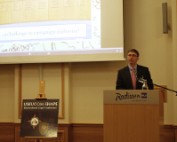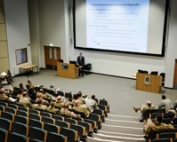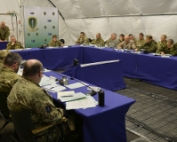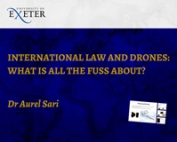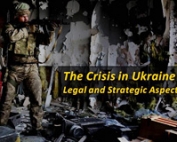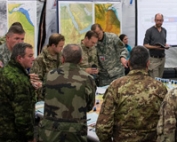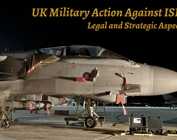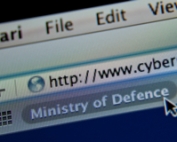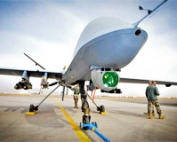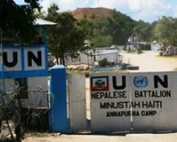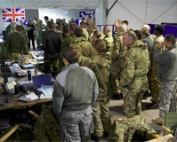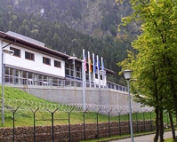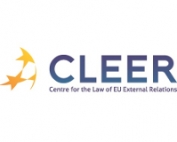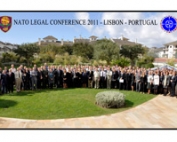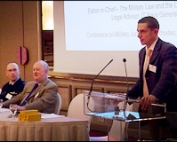Legal Resilience in an Era of Hybrid Threats
It has been a busy few months since the start of the term in September. I have spent some of this time discussing my research on the legal aspects of hybrid warfare with professional and academic colleagues. On 13 September 2017, I spoke before an audience of military and civilian legal advisors in Stuttgart (Germany) to offer an overview of the legal dynamics of hybrid threats, sharing a panel with Jann Kleffner and Kenneth Watkin, chaired by Geoff Corn. The event was convened jointly by the United States African, Central and European Commands. Later that month, I spoke at a conference convened by the International Society for Military Law and the Law of War in Bruges. Sharing a panel with William Boothby, I discussed in greater detail how legal thresholds enable hybrid adversaries to exploit the rules of international law to their own advantage. I also offered a series of recommendations on how nations and international organizations exposed to such tactics may respond. In November, I contributed to a hearing of the Committee on Legal Affairs and Human Rights of the Parliamentary Assembly of the Council of Europe on hybrid warfare and human rights. Sadly, time was short, so I limited myself to explaining the core legal dynamics at play in hybrid warfare. In early December, I visited Paris to contribute, for the second time, to a course on hybrid threats organised by the French Higher Institute for National Defence Studies under the auspices of the European Security and Defence College. The highlight of the term was a trip to Helsinki in November to participate in the launch of the a seminar on legal resilience organised by the European Centre of Excellence for Countering Hybrid Threats. The seminar brought together some 30 participants from different branches of government and embassies of the Centre’s member states. The event saw the launch of a network on legal resilience to serve as a venue, over the coming months, for sharing best practices and experiences in addressing legal vulnerabilities in the context of hybrid warfare; experimentation and exercising to test and refine concepts, shed light on legal vulnerabilities and threats and to explore response mechanisms and procedures; and in-depth research to gain a deeper understanding of a range of relevant themes and subjects.
The International Law of Military Operations Conference
On 21-23 June 2016, the International Society for Military Law and the Law of War (ISMLLW) and Exeter Law School convened an international conference in Exeter, United Kingdom, entitled ‘The International Law of Military Operations: Mapping the Field’. The conference brought together more than 130 legal experts from academia and the armed forces to map the current state of operational law from a comparative and practical perspective and to explore some of the most pressing legal challenges facing the conduct of military operations.
EUCOM/SHAPE Legal Conference
At the end of April, I spent a few days time in Warsaw attending the EUCOM/SHAPE international legal conference. The theme this year was 'The Legal Aspects of the National Security Response to Russian Aggression'. My presentation explored the topic of 'Lawfare on the Home Front'.
ARRCADE BRIEF 2015
This year's ARRC legal conference (ARRCADE BRIEF 2015) focused on the legal challenges presented by hybrid warfare threats. The confernece built on the workshop on hybrid warfare I convened in collaboration with the ARRC in Exeter in September 2015, as well as the lessons learned during exercise ARRCADE FUSION 2015. Read on for a summary of the event by the ARRC public affairs team.
ARRCADE FUSION 2015
I have spent some time in Latvia with the ARRC on its annual exercise, ARRCADE FUSION 15. The exercise was designed to tests the ARRC's 'ability to control simulated troop formations within a challenging and dynamic fictional scenarios'. Make sure you watch the video about the exercise.
International Law and Drone Warfare: What is all the Fuss About?
In July 2015, I gave a presentation on the international law aspects of drone warfare at St Athan in Wales. I focused primarily on the questions arising under the rules governing the use of force (jus ad bellum) and those governing the conduct of hostilities (IHL). One of the points I emphasized was that unmanned aerial vehicles are not unlawful weapons systems as such, a point which by now seems to be generally accepted. However, I also suggested that the actual use of these systems does raise a number of legal difficulties.
The Crisis in Ukraine: Legal and Strategic Aspects
On 17 November 2014, we hosted a seminar on the crisis in the Ukraine. Adopting a familiar format, we discussed the legal and strategic aspects of recent developments with the help of two speakers. Dr Tamás Hoffmann of Corvinus University Budapest gave as an insight into the questions of international law raised by the internal turmoil in the country, the subsequent events in the Crimea and the current conflict raging in the Donbass region. We then turned to Dr Daniel Steed from our Strategy and Security Institute, who offered an overview of the bigger strategic picture and gave us a detailed local and regional forecast of the likely strategic developments.
ARRCADE FUSION 2014
I have spent three days with HQ Allied Rapid Reaction Corps (ARRC) on its annual training exercise, ARRCADE FUSION 14, in November 2014. The exercise took place at RAF St Mawgan near Newquay in Cornwall. One of its aims was to test the air and sea command capability of the ARRC, following its 'upgrade' to a combined joint task force headquarter.
UK Military Action against ISIS: Legal and Strategic Aspects
On 26 September 2014, Parliament approved British military intervention in Iraq against Islamic State by 524 to 43 votes. The previous day, the Government published a summary of its legal position for military action, suggesting that the consent of Iraq ‘provides a clear and unequivocal legal basis for the deployment of UK forces and military assets to take military action to strike [Islamic State] sites and military strongholds in Iraq.’ On 6 October 2014, we convened a 'rapid reaction seminar' to offer some initial thoughts on the legal and strategic aspects of this development.
Future War and the Evolution of IHL
On 1 May 2014, Professor Michael N Schmitt delivered a seminar on 'Future War and the Evolution of IHL' at Exeter Law School. In his talk, Professor Schmitt offered his thoughts on the relationship between changes in the nature of warfare and the evolution of international humanitarian law. In particular, he asked how future warfare is likely to shape the interpretation and application of international humanitarian law, focusing on the effect of cyber operations, the fielding of autonomous weapon systems, and increased visibility of the battlespace. I had the pleasure of acting as a respondent.
Exeter day conference on Targeted Killing
On 29 April 2014, we hosted a day conference on Targeted Killing: Clearing the 'Fog of Law' at the University of Exeter. The event started with a presentation by Professor Michael Schmitt, with Professor Charles Garraway and Dr Anicée Van Engeland acting as respondents. In the afternoon, Major General (ret) Jerry Thomas CB DSO offered his personal view on drone warfare. The event was hosted jointly by the and the Exeter Research Programme in International Law and Military Operations convened under the auspices of Strategy and Security Institute.
Rule of Law and Accountability in Peacekeeping
In January 2014, I have presented some of my work on the legal aspects of peace support operations at a one-day workshop on the Rule of Law and Accountability in Peacekeeping held on 28 January 2014 in Berlin. The workshop was jointly convened by the Friedrich Ebert Foundation, the United Nations Association of Germany and the Center for International Peace Operations.
ARRCADE FUSION 2013
Multinational military exercise in Cornwall
International Law of Cyber Operations
NATO School Oberammergau
The Tallinn Manual on Cyber Warfare
Guest Lecture by Professor Mike Schmitt at Exeter Law School
CLEER Workshop
Human Rights and EU Crisis Management Operations
HPCR Live Seminar
On 26 January 2012, I contributed to an online seminar on Regulating the Conduct of Military Personnel in Peace Operations, hosted by the Program on Humanitarian Policy and Conflict Research at Harvard University. Repeated reports about human rights abuses committed by members of peace support operations have raised important questions about the legal framework applicable to peace operations and the need to hold the perpetrators of such abuses to account. My contribution focused on the role of status of forces agreements in this context.
NATO Legal Conference 2011
Conference on 'Partners, Cooperation and Ad Hoc Relations'
MLLWR Panel in Rhodes
Website launch and conference panel on legal advisors in the armed forces
Conference on NATO SOFA
Conference in Tallinn celebrating the 60th anniversary of the NATO SOFA



